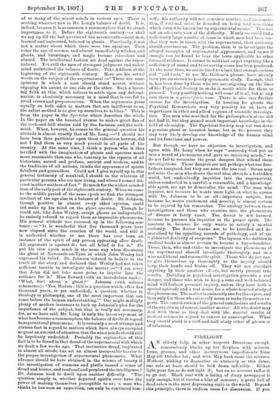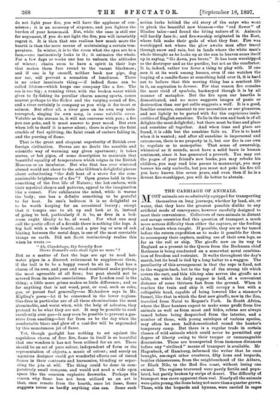FIRELIGHT.
AN elderly lady, in other respects luxurious enough remorselessly blocks up her fireplace with mirrors ferns, grasses, and other incongruous impediments from May till October 1st ; and with May back come the mirrors. Without wishing to dogmatise so austerely as this dame, one rule at least should be laid down inflexibly. Either light your fire or do not light it ; but on no account suffer it to go out. Black coal with a lining of dingy newspaper is ugly enough, but it carries a hint of Bummer; a grate full of dead ashes is the most depressing sight in the world. Beyond this principle, there is endless room for discussion. If you do not light your fire, you will have the applause of con- science ; it is an economy of sixpence, and you lighten the burden of your housemaid. But, while the case is still one for argument, if you do not light the fire, you will invariably regret it. It is then that one realises how much more the hearth is than the mere means of maintaining a certain tem- perature. In winter, it is to the room what the eyes are to a face,—one instinctively looks to it ; it animates the whole. For a few days or weeks one has to unlearn the attitudes of winter; chairs seem to have a spirit in their legs that makes them face round to the vacant blackness; and if one is by oneself, neither book nor pipe, dog nor cat, will prevent a sensation of loneliness. There is no other inanimate thing— if indeed flame can be called lifeless—which keeps one company like a fire. The sea is too big ; a running river, with the broken water which gives to fly-fishing its peculiar charm among sports, comes nearest perhaps to the flicker and the varying sound of fire, and a river certainly is company as you whip it for trout or salmon. But after all, a river goes on its own way unin- terrupted, singing its own song, in omne volebilis amum Voluble as the stream is, it will not converse with you ; a fire you can poke, and it must answer to your mood. But even when left to itself it is never silent; there is always the faint crackle of fuel splitting, the faint crash of embers falling in, and the purring of flame.
That is the great and eloquent superiority of British over foreign civilisation. Stoves are no doubt the sensible and scientific way of warming any given apartment; it takes stoves, or hot .pipes, of some description to maintain that beautiful equality of temperature which reigns in the British Museum or an incubator. But who that has ever wintered abroad would not cheer to the echo Gibbon's delightful phrase about substituting "the dull heat of a stove for the com- panionable brightness of a fire "? Open grates hold in them something of the free life of Nature ; the hot embers, with their mystical shapes and patterns, appeal to the imagination like a sunset. Fire exhilarates the mind, while it warms the body ; one has a definite something to be grateful to for heat. In one's bedroom it is so delightful as to be worth keeping for an occasional luxury ; except that it tempts one to sit up and look at it, instead of going to bed, particularly if it be, as fires in a bed- room ought ideally to be, of wood. For what one may call the poetic effect of a fireside there is nothing like logs. A big hall with a wide hearth, and a pine log or arm of oak blazing between the metal dogs, is one of the most covetable things on earth. Did not Scott instinctively realise this when he wrote :— " Ah, Clandeboye, thy friendly floor Slieve Donard's oaks shall light no more" ?
But as a matter of font the logs are apt to need hot- water pipes in a discreet retirement to supplement them, if the hall is to be a happy resort to sit in. Peat has a charm of its own, and peat and wood combined make perhaps the most agreeable of all fires ; but peat should not be severed from its native associations. For London coal is the thing; a little more grime makes so little difference ; and as for anything that is not wood, peat, or coal, such as coke, gas, or patent fuel generally—as McAndrew says in Mr. Kipling's poem—let it be consumed in the lower regions. Gas-fires in particular are of all these abominations the most abominable, and worst when, with the help of asbestos, they pretend to be what they are not. It may be possible to cook excellently over gas—it may even be possible to prevent a gas- stove from smelling—but far from us be the day when the comfortable blaze and glow of a coal-fire will be superseded by this monotonous jet of flame.
Yet, though gaslight has nothing to set against the capricious charm of free fire, flame in itself is so beautiful that one wonders it has not been utilised for an art. There should be an art of pure colour, independent of form or the representation of objects, a music of colour ; and surely an .ngenious designer could get wonderful effects out of tinted dames in their contrasts and harmonies, blending or separ- ating the jets at will. The thing could be done in com- paratively small compass, and would not need a wide open space like the common explosive fireworks. Perhaps the reason why flame has not been utilised as an art is that, once remote from the hearth, once let loose, flame suggests terror as hardly anything else can. Some such notion lurks behind the old story of the satyr who went to pluck the beautiful new blossom—the "red flower" of Hindoo tales—and found the biting nature of it. Animals will hardly face it ; and fire-worship originated in the East, where folk make their gods of what they fear. Fire was worshipped not where the glow awaits man after travel through snow and rain, but in lands where the white man's whole thought as he looks up at the sun in heaven sums itself up in saying, "Go down, you brute." It has been worshipped as the destroyer and as the purifier, but not as the comforter. It is, indeed, rather too fierce a thing to play with. If one sees it at its work among houses, even if one watches the leaping of a candle-flame at something held over it, it is hard not to believe that this moving thing has a sentient life in it, an aspiration to devour. For that reason fire remains the most vivid of symbols, hackneyed though it is by all manner of metaphor. But the fire upon our hearths is domesticated, and no more suggests images of panic or destruction than our pet collie suggests a wolf. It is a good, familiar creature, constant to our necessities or our pleasures, and not lightly to be parted with for the capricious insin- cerities of English sunshine. To lie in the sun and bask is of all delights the most delightful; but there must be time and place and sunshine all together. And when time and place are found, it is odds but the sunshine fails us. Fire is to hand when it is wanted ; and after all sunshine is impersonal and extraneous, there is no property in it, but our fire is our own to regulate or to monopolise. That sense of ownership, whimsical as it sounds, must have a solid basis in human sentiment, since it has generated a proverb. You may cut the pages of your friend's new books, you may rebuke his children, you may read him poems in manuscript, you may borrow his only umbrella, but you must not poke his fire till you have known him seven years, and even then if he is a devout fire-worshipper, you will do better to abstain.



































 Previous page
Previous page